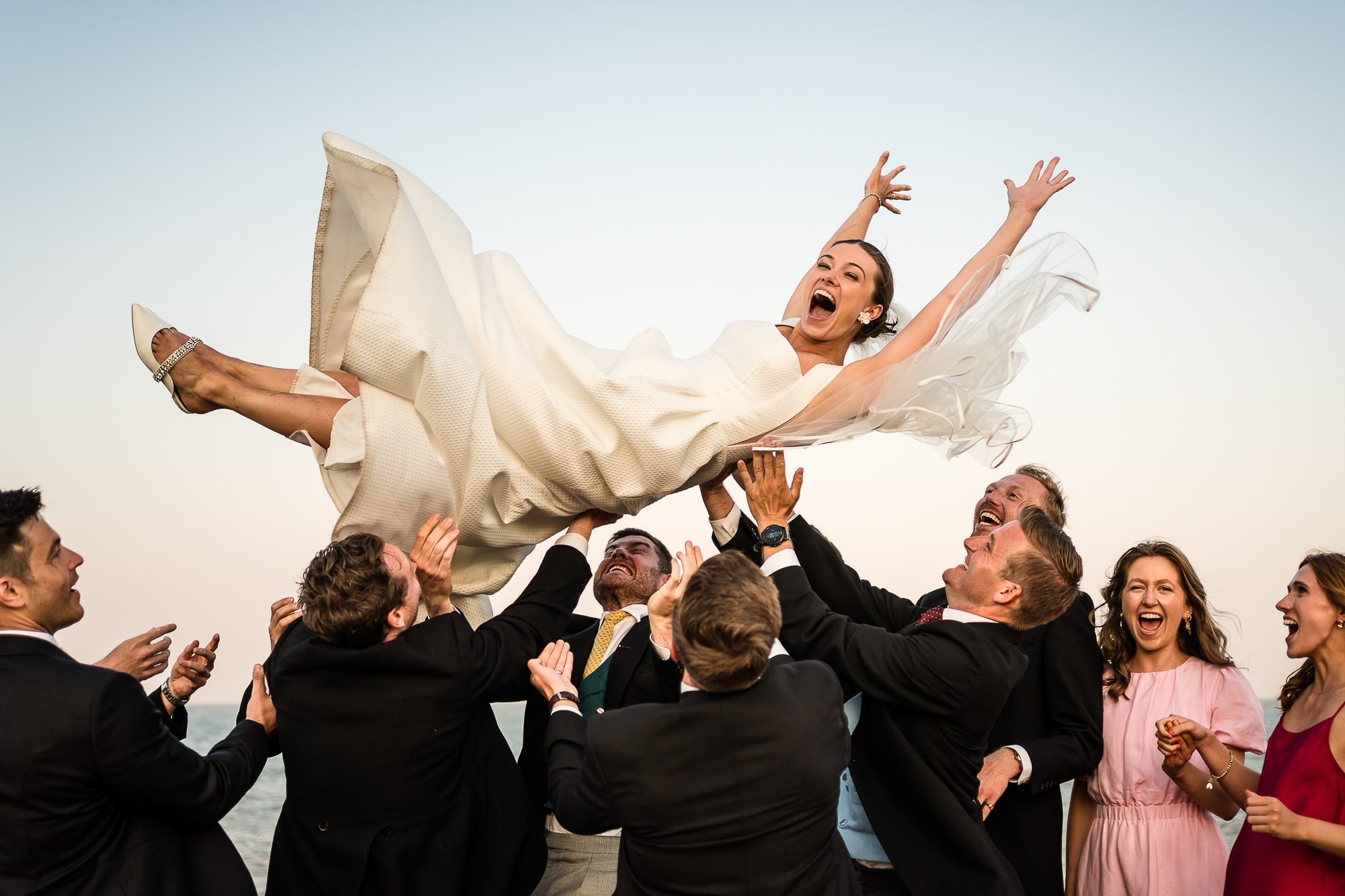
How much does wedding photography cost? | The ultimate guide 2024
January 6, 2024
Congratulations! You’re engaged and wondering how much does wedding photography cost? You’ve probably looked around at some photographer’s websites and worked out it’s a complete minefield. Some photographers seem way too cheap, some way too expensive, some just plain confusing and the rest… well, they don’t include their price at all.
Before you begin trying to decipher the myriad of pricing PDFs you’re about to receive, here’s our ultimate guide on wedding photography pricing. It’s very long but once you reach the end you will be clued up and confident to book your wedding photographer.
Contents:
- What’s the average cost of a wedding photographer?
- What should we be paying for a wedding photographer?
- Types of Wedding Photography Packages
- What’s included/not included in wedding photographer pricing?
- How to ask a wedding photographer for their pricing
- What else affects wedding photography prices?
- Is copyright and print licencing included?
- How does paying and hiring a wedding photographer work?
- Frequently asked questions
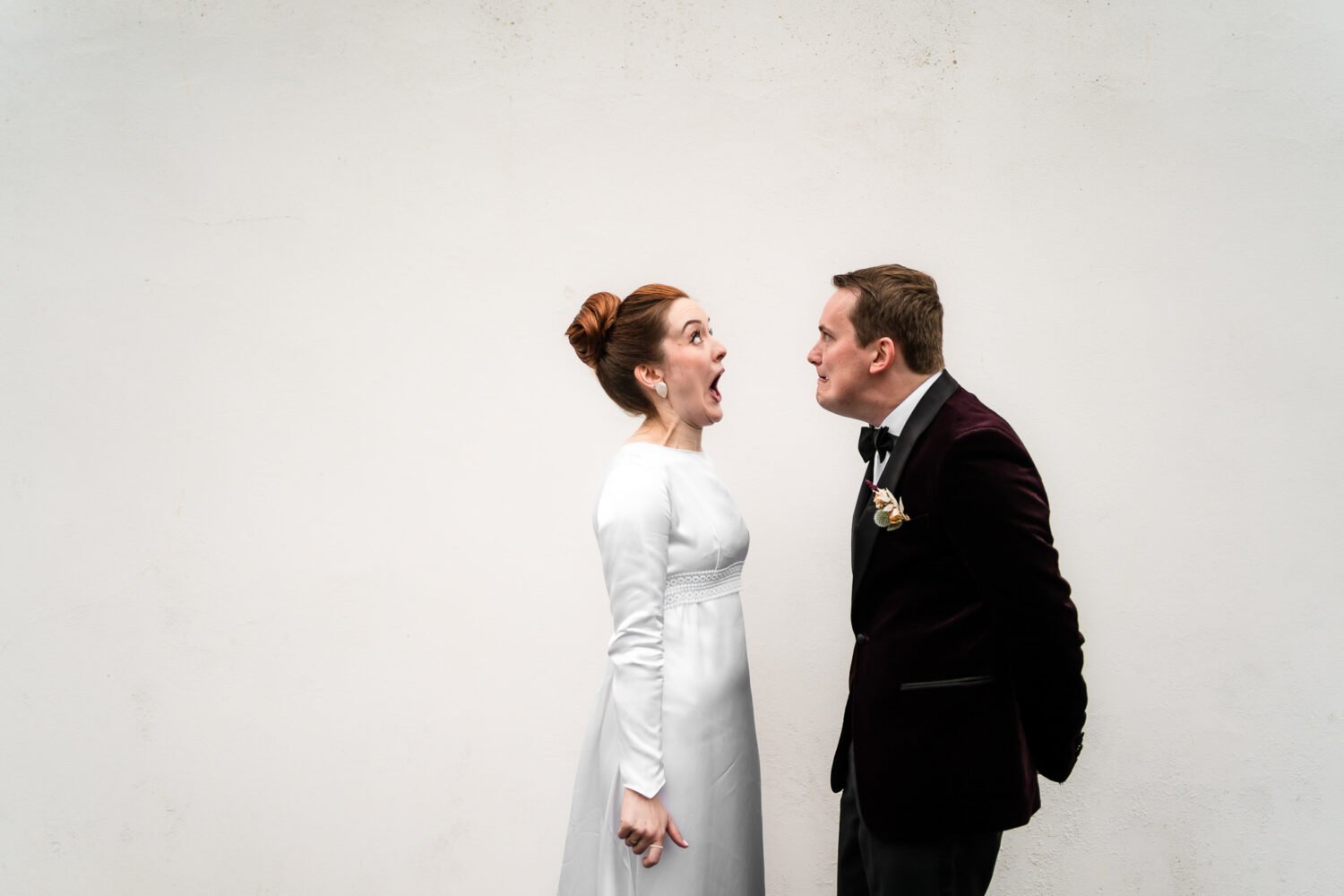
What’s the average cost of a wedding photographer?
According to Bridebook’s January 2023 survey of nearly 4000 UK couples, the average wedding photographer spend in 2022 was £1289. Hitched’s 2023 wedding survey of 2,400 British couples found that the average wedding photographer cost in 2022 was £1,300.
A wedding photographer’s base pricing includes their skill, expertise and experience, along with the efforts invested in pre-wedding preparations and post-production such as editing.
What should you be paying for a wedding photographer?
Okay, so we all know we should take averages with a pinch of salt. Here’s a table we’ve put together of wedding photographer prices and the level of experience you should expect for the money. Assume that this includes all-day coverage and no extras such as albums, etc (which we will explain later).
Please note the table below is a rough guide and there are exceptions to these rules and factors which could influence these (such as the cost of living crisis and the geographical location of the photographer) but this is what we have found to be the case overall, in our experience.
If you’re wondering who we are or what our expertise is you can find out about us here.
| £200 – £500 | – Little to no experience – Photographed around 0-10 weddings – In their first 0-12 months of starting – They are pursuing wedding photography as a hobby alongside a full-time job. – Could be a photography student – Doesn’t have insurance and the correct professional equipment to ensure that your photos are safe (for example: a camera with two SD card slots). – No idea of who they are as a photographer and what their style is. – Talks about being a “natural light” photographer which means they have little to no proficiency using flash (which is sometimes necessary when shooting a wedding). |
| £600 – £1000 | – Around 1-3 year’s experience – Photographed around 10-40 weddings – They are pursuing wedding photography as a hobby alongside a full-time job. – Doesn’t have insurance and the correct professional equipment to ensure that your photos are safe (for example: a camera with two SD card slots). – Starting to get an idea of who they are as a photographer and what their style is. – Talks about being a “natural light” photographer which means they have little to no proficiency using flash (which is sometimes necessary when shooting a wedding). |
| £1100-£1300 | – 3-5 year’s experience – Photographed around 40-100 weddings – They are pursuing wedding photography as a hobby alongside a full-time job. – Has some insurance and some of the correct equipment. For example, they could have a camera with 2 SD card slots but their backup camera isn’t professional grade. – Starting to get an idea of who they are as a photographer and what their style is. – Is now using presets they found online (cookie-cutter style editing). – Has some competency with flash but isn’t confident and will use it reluctantly. |
| £1400 – £1500 | – 5-8 year’s experience – Photographed around 100-200 weddings – Wedding photography is their full-time job but they may have another part-time job to tide them over. – Has insurance and the correct professional equipment to ensure that your photos are safe (for example: a camera with two SD card slots). – Has a distinctive style and branding. – Generally competent but quality can vary from wedding to wedding. – They have an editing style but it may be “fashionable” and therefore isn’t timeless. – Has some competency with flash but isn’t confident and will use it reluctantly. – Has some accolades and plenty of positive reviews. |
| £1600 – £2000 | – 8+ years of experience. – Photographed over 200 weddings. – Full-time photographer with comprehensive insurance and backup systems. – Consistent results across weddings, with a developed and timeless editing style. – Able to handle various lighting challenges and navigate difficult conditions. – Numerous accolades and glowing reviews from past clients. |
| £2100 – £3000 | At this range, you’re working with a photographer who has all the expertise of a £1600-£2000 photographer with these additional advantages: – National recognition in the industry, standing out amongst peers. – Highly distinctive and recognisable style with a polished, cohesive portfolio. – Can offer a more involved experience, guiding and enhancing the flow of the day to capture high-quality images without sacrificing authenticity. |
| £3100+ | We would expect a £3100+ wedding photographer to have the same experience as a £2100-£3000 wedding photographer, with the following differences: – They are internationally recognised. – They offer tutorials, training, and expertise to other wedding photographers. – They are a household name amongst other wedding photographers. |
It’s important to note that photographers at any price bracket will gatekeep their pricing. Don’t assume that because they don’t show their prices on their website they must be expensive or “good”.
Our table isn’t designed to scare you. We just wanted to give you a really clear idea of what you should expect at each price point. You can find excellent photographers at any price bracket if you do enough thorough research, know what you’re looking for and get lucky.
If you’re on a budget the biggest piece of advice we can give to you is don’t get married during the winter months as this is where most novice photographers struggle. If you book an inexperienced wedding photographer to shoot your wedding in January, you will be disappointed.
Always book the best photographer you can for the budget you have.
Before we move on to the next section we thought we would explain some other things in the table.
- 1 year in the industry may sound like a lot but bear in mind most people book a wedding photographer around 12 months before. 1 year in the wedding industry is nothing compared to other industries.
- Flash photography is where photographers bring their own additional lighting which they either put on their camera or a flash stand. This can be super important in conditions where the light is either low or gives off horrible colours. Here are some of our examples of flash photography:

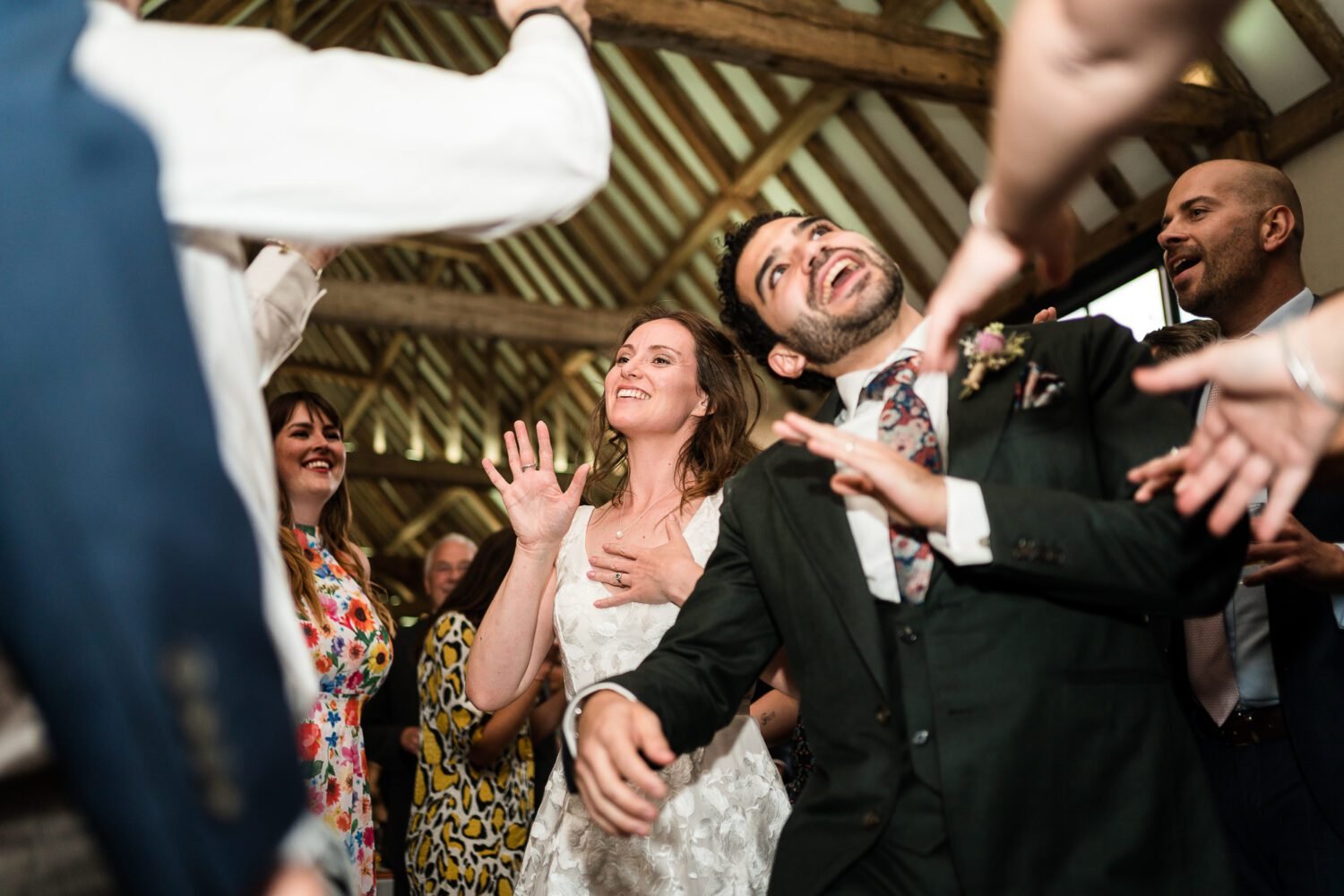
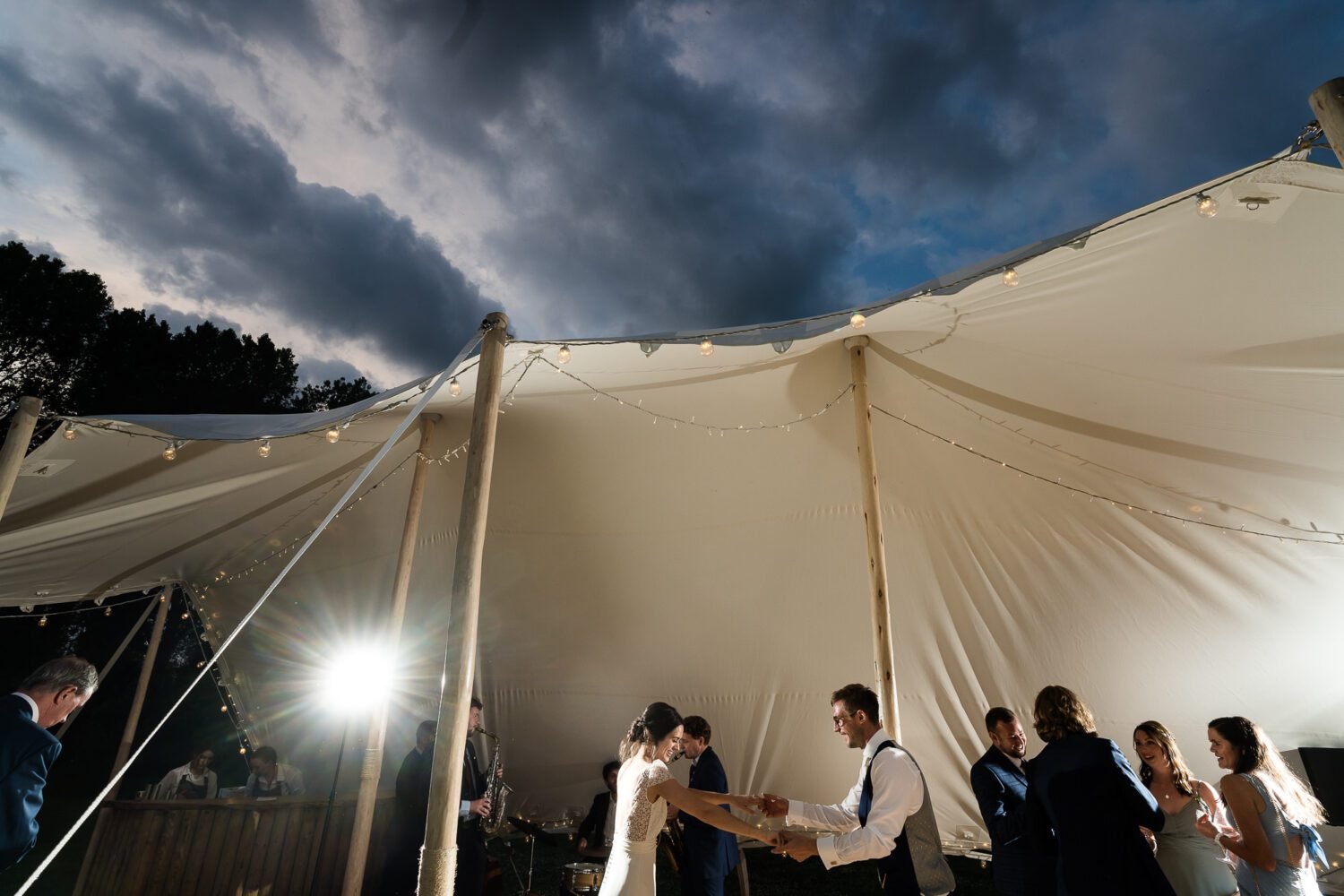

Types of Wedding Photography Packages
We’ve explained how pricing relates to the photographer and their expertise. The way their prices are shown online is different and often veiled in various “lovey-dovey” packages.
Here’s a quick decipher of what most of those packages include and look like:
- Short-day Coverage:
- Ideal for couples seeking bare-bones coverage and perhaps have only organised a shorter day.
- Typically includes photography during the ceremony and an hour or two after.
- Can often be tailored to add on more hours if needed but often won’t be as cost-effective as booking a wedding photographer for a full day.
- Full-Day Coverage:
- Comprehensive coverage from the preparation stage to the end of the first dance.
- Ensures no moment is missed, providing a complete visual narrative.
- Engagement Shoot Packages:
- Offers a separate photoshoot session before the wedding day.
- A great way to get comfortable in front of the camera and capture additional memories.
- Album Packages:
- Includes a professionally designed wedding album.
- Provides a tangible keepsake showcasing the highlights of your day.
- Digital-Only Packages:
- Suited for couples who prioritise digital files over physical prints.
- Provides high-resolution images for personal use and sharing.
- Choose hours of coverage, additional photographers, or specific add-ons.
You can also get packages that encompass different variations of the ones shown above. Because packages are often confusing, the majority of wedding photographers are moving away from them. For example, we offer two full-day options (one with or without an album) and our short-day coverage. You can see our pricing here.
Sit down with your partner and write down a list of what you’re looking for. If you’re not sure, move on to our next section where we detail what extras professional photographers tend to offer.
What’s included/not included in wedding photographer pricing?
Wedding photography pricing is often made up of the following things:
- Number of hours (often called “coverage”).
- Amount of photographers (often one or two. Additional photographers are often called “second shooters”).
- Professional Wedding albums.
- Coffee table books.
- Engagement shoots.
- Prints and products such as USBs.
- Travel costs and accommodation if travelling from afar.
Whether or not these things are included will be entirely down to the photographer.
Here’s a table of what these extras often cost:
| Minimum spend | Maximum spend | |
| Extra coverage | £50 per hour | £500 per hour |
| Second shooter | £100 | £500 |
| Professional Wedding album | £500 | £2000 |
| Coffee table book | £200 | £500 |
| Engagement shoots | £100 | £600 |
| 5×6 print | 50p | £10 |
We don’t condone the pricing in the “minimum spend” or “maximum spend” columns but we wanted this article to be unbiased and to offer an informative overview of wedding photography costs and pricing.
What’s the difference between a “coffee table book” and a “professional wedding album”?
A coffee table book will be similar in quality to what you can buy online from high-end retailers such as Milkbooks and Papier. A professional wedding album, on the other hand, involves fine art printing methods, which are renowned for their archival quality. This means that the colours won’t fade over time, ensuring a lasting and vibrant representation of your wedding photos. Often these are traditionally bound by hand in fine materials such as leathers and silks.
How to ask a wedding photographer for their pricing.
Some photographers don’t share their pricing online and will try to send you on a virtual quest to find out. They’ll insist on an email, inside leg measurement and other ‘Lord of the Rings’ type efforts to see how much they cost. Photographers who hide their pricing are an interesting bunch of people. They live in a world where they imagine you will fall in love with them and their work so much so that you will not feel the need to ask them about pricing at all.
However, we all know that that isn’t the case and we are all people with financial constraints one way or another. There is a correct way of asking about pricing so you create the right vibe. An incorrect way would be to email them simply saying “Hello, how much for a full day?”. This will inevitably set you off on the wrong foot as some photographers are a bit artsy and prickly.
Instead, email them the following:
- Your wedding date.
- Why you have contacted them (you love their portfolio/website, etc).
- Then ask them about pricing.
If the photographer you like has their pricing detailed on their site (like us ?) then you don’t need to worry about this.
What else affects wedding photography prices?
Outside of the photographer’s experience levels and the different things included, there are other factors which could affect the price. These things are:
- Location. For example, a wedding photographer in London will cost more than one in Norfolk.
- Off-peak weddings. Sometimes photographers will offer discounts for weddings that take place during the week or out-of-season months. This isn’t always the case, however.
- How close they are to you. If you book a wedding photographer who isn’t local, they will most likely need to charge for travel and possibly accommodation.
- Destination weddings. Of course, these attract higher travel and accommodation costs.
Is copyright and print licencing included?
This is something we often see explained incorrectly. First of all, let’s explore what these two things are.
- Copyright: Copyright means the photographer owns the exclusive rights to their images. The photographer retains control over commercial use. What this means in English is whoever owns the copyright can use the images for financial gain, such as putting them on t-shirts to resell or (more likely) using the images on banners at wedding shows.
- Print licence: A print license grants clients the right to reproduce and print images for personal use. It can specify the terms and limitations, such as the number of prints allowed and who this extends to.
A photographer should never give away copyright unless there are exceptional circumstances. Imagine the Bride is Taylor Swift for example. She probably wouldn’t want her wedding photos sold to OK magazine without her say so (an agreement in this case will be agreed between photographer and client where the client will pay for copyright and exclusive use).
A print licence should always be included. The details of this will vary from photographer to photographer. Here are some things to watch out for:
- Has the photographer limited how many photos you can download and/or print? If so, do you have to pay extra per photo?
- Who is the print licence available to? Just you two as the main client, or your family and friends as well? For example, the photographer can organise the online gallery so only you can download the images for free but your family and friends have to pay.
Print licencing terms example
We offer a print licence to all of our clients, their family and friends. We offer prints and products via the online gallery but our clients can also use the print licence to access external print sources. When they download their photos from their online gallery, a print licence is automatically downloaded alongside the photos which looks like this:
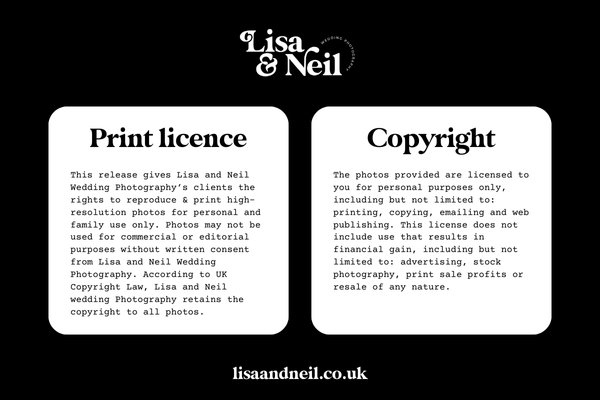
How does paying and hiring a wedding photographer work?
You’ve now found a wedding photographer online who you like the look of and fits within your budget. This is what to expect next:
- Initial Consultation: Begin by scheduling an initial consultation with the wedding photographer of your choice. During this meeting, you can discuss your vision, preferences, and specific requirements for capturing your special day. This is also an opportunity to ask questions, review the photographer’s portfolio, and gauge their compatibility with your style and expectations. Any professional photographer should also send you full galleries to review.
- Quote and Contract: Following the consultation, the photographer will provide you with a detailed quote outlining the services, packages, and associated costs. Once you’ve agreed on the terms, a formal contract will be prepared. It’s crucial to carefully review the quote, ensuring that all the details discussed during the consultation are accurately reflected. Be sure to clarify any uncertainties before proceeding.
- Deposit and Booking: To secure the photographer’s services for your wedding date, a deposit is typically required. This deposit, ranging from 10% to 30% of the total package cost, serves as a commitment fee and is non-refundable. Upon receipt of the deposit and a signed contract, your wedding date will be officially reserved on the photographer’s calendar.
- Payment Schedule: The final balance will be due before your wedding day which is standard practice.
- Engagement Session (Optional): Some wedding photography packages include an engagement session, providing an opportunity for you and your photographer to establish rapport and get comfortable working together before the big day. If this is part of your package, the photographer will coordinate the timing and logistics with you.
- Finalising Details: As the wedding day approaches, finalise any remaining details with your photographer. This may include running through timings, logistics and any unique considerations related to your venue or event.
- Day-of Coordination: On the wedding day, your photographer will work diligently to capture the special moments, emotions, and details as they unfold. Their experience and expertise in wedding photography will help ensure that your memories are beautifully documented.
Frequently asked questions
How do I know if a wedding photographer’s work is of “good quality”?
All that matters at the end of the day is whether or not you like their work. Some things to look out for include; do they shoot from a variety of different angles? Do the people in their photos look happy/comfortable/confident or do they look awkward? Are their reviews good and/or do they have plenty of accolades?
Do we need a second photographer?
As a husband and wife team, being completely impartial here is a challenge. However, we genuinely believe that opting for a duo surpasses hiring a single photographer with a second shooter, and certainly trumps going for a lone photographer.
Beyond the obvious benefits of comprehensive coverage and simultaneous preparation shots, there’s a bonus – a more relaxed and chilled photographer. When you book two photographers who are always in sync, their synergy and quality shine through. They’re a well-practised team, and you can expect top-notch results.
In contrast, choosing a solo photographer with a second shooter might introduce some unevenness. Second shooters, more often than not, are still finding their way in the world of wedding photography. It’s not a knock on their talent; it’s just the nature of the gig. If they were seasoned pros, they’d probably be running their own show instead of second-shooting for others.
How much coverage is enough?
If you’re looking for full-day coverage then you’ll need a minimum of 8 hours. Determining how much you need after this depends on your day and how important getting ready and party photos are to you. If you’re looking for shorter day coverage or just the ceremony and some photos afterwards, then 2.5 hours is typical. Speak to your chosen photographer and they can help guide through your timings and what is or isn’t needed.
Do we need to feed our photographer?
In almost every instance, yes. We are the rare exception because we decline. This is because we like to be totally independent and in charge of our own timekeeping on the day.
How many photos does a wedding photographer give you?
The quantity of wedding photos you’ll receive not only differs among photographers and their packages but is also contingent upon the unique dynamics of your wedding and the available photo opportunities. If your wedding is filled with fun stuff, you’re going to get more photos.
Photographers may capture thousands of shots during a wedding, meticulously curating the selection to retain the best moments and eliminating those that don’t meet their standards. Typically, photographers outline the expected number of edited images in their packages, providing clients with a clear guideline.
For a full day you should expect at least 450 photos. Photographers will have the minimum amount of photos they will deliver written up in their contract.
If you’re planning a wedding chat to us, we love talking about this shizzle. Contact us here.